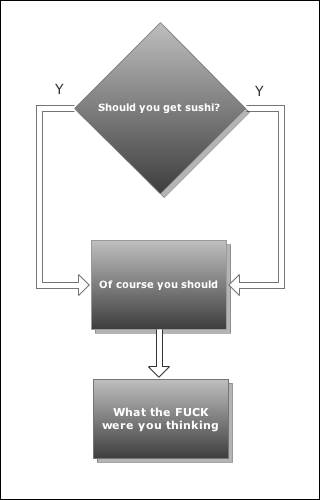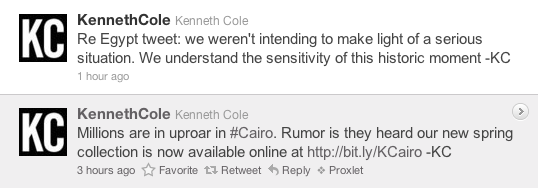And I like it! But I think that, in a fit of pique, I won’t be buying any more of his clothes. Screenshot against its inevitable disappearance:
Category: Obsessions
I ripped this off from a chart Adam Parrish posted years ago and I can’t find it now
For your convenience and edification, I present herein the Brendan Adkins Lunchtime Heuristic Decision Chart. It has served me well for years, and I can confidently recommend its immediate adoption.

I am a lot better at Javascript than I was a few months ago
I am, under normal circumstances, a very reliable exhibit of the human behavior pattern that goes “my stupid system sort of works so I will never change it.” But there are times–rare ones–when my desperation to avoid writing fiction actually overcomes my desperation to avoid writing code. Tonight, after three years of counting words for Anacrusis with a hacky PHP script I wrote in 2007, I finally reached one such point.
This is the word counter I’m going to use from here on out. Unlike the old script, which I was reluctant to publicize because it involved processing user-submitted text on the server side, this is all Javascript and it updates in real time. You can also click the little tab at the bottom if you want to see what the hell it thinks it’s doing.
Stories We Tell, The
My dear friend Joe Mcdaldno–writer, game designer, and fascinating Renaissance human–was kind enough to interview me about Anacrusis for his nascent radio show/podcast, The Stories We Tell. This marks the third podcast to feature me, and my second time on Canadian radio. Soon, listening to my nasal drone trail off in the middle of half-baked jokes will be completely unavoidable!
Incidentally, the term I can’t think of at around 16:45 is syllepsis (and more generally zeugma).
Tasha Robinson is great and you should read everything she writes
But just to be clear, the above statements are not causally connected:
“Separating artist and art can just plain be difficult. More than a decade ago, I talked over this issue with a prominent, veteran science-fiction author who’s won every major award in the field. He came down firmly on the side of the importance of the art over the artist. And then he paused, thought about it for a minute, and added something to the effect of ‘Except when it comes to Harlan Ellison. Ever since I met him, I can’t read anything he’s written without hearing it all in that high-pitched, angry little voice of his.'”
“Like a zombie, it keeps on living”
I was bagging on the Washington Post the other day for letting itself bend to the government’s whim. I stand by that, but I also want to give the institution its due: their two-year investigation of the American intelligence industry is amazing, and terrifies me.
“When hired, a typical analyst knows very little about the priority countries – Iraq, Iran, Afghanistan and Pakistan – and is not fluent in their languages. Still, the number of intelligence reports they produce on these key countries is overwhelming, say current and former intelligence officials who try to cull them every day. The ODNI doesn’t know exactly how many reports are issued each year, but in the process of trying to find out, the chief of analysis discovered 60 classified analytic Web sites still in operation that were supposed to have been closed down for lack of usefulness.
Even the analysts at the National Counterterrorism Center (NCTC), which is supposed to be where the most sensitive, most difficult-to-obtain nuggets of information are fused together, get low marks from intelligence officials for not producing reports that are original, or at least better than the reports already written by the CIA, FBI, National Security Agency or Defense Intelligence Agency.
When Maj. Gen. John M. Custer was the director of intelligence at U.S. Central Command, he grew angry at how little helpful information came out of the NCTC. In 2007, he visited its director at the time, retired Vice Adm. John Scott Redd, to tell him so. “I told him that after 41/2 years, this organization had never produced one shred of information that helped me prosecute three wars!” he said loudly, leaning over the table during an interview.
Two years later, Custer, now head of the Army’s intelligence school at Fort Huachuca, Ariz., still gets red-faced recalling that day, which reminds him of his frustration with Washington’s bureaucracy. “Who has the mission of reducing redundancy and ensuring everybody doesn’t gravitate to the lowest-hanging fruit?” he said. “Who orchestrates what is produced so that everybody doesn’t produce the same thing?”
Twitter is creepy
Yesterday I twittered a thing about the prostate cancer vaccine approval and this is what I got in my inbox the next morning.

WELL GOOD.
This is the least useful blog entry I have ever posted
I finally figured out what delineates the podcasts I like from ones I completely can’t stand and want to punch in the mouth! SHUT UP I HAVE BEEN THINKING REALLY HARD ABOUT THIS FOR YEARS
Okay, here it is. The first podcast I listened to regularly was the Daily Affirmation, Kris Straub and Scott Kurtz’s little morning chatter that they would record off the cuff while starting work in their studio. I am a Kris Straub superfan, as is well established, and I like Scott Kurtz too (actually, I like Scott Kurtz more than I like PvP). I really liked it, and that led me to the Penny Arcade podcast, probably my favorite collection of nonmusical audio ever. I listened to both of those corpuses repeatedly; they kept me sane and amused during long, boring days of working from home or driving across the country. They’re much of the reason I started doing a podcast of my own.
Here’s the thing: Scott and Kris did another podcast called the Power Hour, which was also them just talking, taking callers, like a radio show. I tried listening to it a couple times, and I never liked it. This is much the same setup as the podcast Kris and David Malki ! have now, called Tweet Me Harder, which I listen to out of loyalty and don’t mind, but of which I’m still not particularly fond.
This contradiction repeats: I love Dan Savage, both in writing and persona, but the Savage Lovecast turns me off. I don’t read the webcomics Sheldon or Evil Inc., but when their creators (Dave Kellett and Brad Guigar) show up with Kris and Scott on Webcomics Weekly, I really enjoy it. I can’t stand any of that hip snarky bullshit on Jordan Jesse Go or You Look Nice Today (they engender the aforementioned desire for mouth-punching). I have a well-known affection for Mr. Glass and This American Life, but actually listening to that show is too much mental work on podcast time, which is almost always during work hours.
So maybe I just like podcasts about webcomics? Yet I love listening to some creator commentary on movies and TV shows, and in particular, I’ve listened to one episode of the old Battlestar Galactica podcast–where the creator, his wife and a large chunk of the cast got together and just talked about the show for hours–again and again. But when the commentary is just the director talking to himself (or when the BSG podcast was just Ron Moore) I don’t care.
This is my working theory right now: I like listening to people who care about their work talking to each other about how they make it. It’s fascinating, funny, educational and sometimes thrilling. But I can’t stand listening to people talk for the sole purpose of being listened to, even people whose work I admire. The fact that people who are talking about the things they make tend to be unself-conscious when they get into a dialogue helps avoid the potential overlap between those paradigms.
Anyway, this is why if you mention Jesse Thorn to me in any context I will throw something at you. I have a rant for another day about how much Put This On sucks compared to the late, lamented Manual of Style.
More on transparency versus regulation
Aaron Swartz has a better essay than I could have put together on why transparency alone is ineffective and even harmful.
Attention conservation notice
I know I’m kind of harping on this, but I remain really upset and angry about the Citizens United decision, and it would appear I am not alone. Public Citizen and three other organizations have launched Free Speech for People, a campaign to fix the problem, constitutionally or otherwise. Even if you don’t feel like signing their petition or throwing some money at them, they’ve got a blog that I hope will be a good clearinghouse for news on the fight.
Uncle John has made the case that requiring full disclosure of corporate campaign spending would be a good compromise solution–that transparency would allow voters to simply turn away from candidates if they didn’t like where their money was coming from. I respect that opinion, but I really couldn’t disagree more.
We already have disclosure requirements that the decision didn’t affect, and they haven’t yet solved anything. Disclosure didn’t keep Max Baucus from getting the tiller on health care reform after taking four million dollars from the health care industry. It didn’t keep Mitch McConnell from taking three hundred thousand from coal and then, coincidentally, fighting to keep mine owners from having to measure mercury discharge. It’s already a shock when an entrenched politician manages to say a few stern words about a regressive, destructive industrial backer; actual voting that way is unheard of. Doesn’t that indicate our ingrained acceptance that our representatives’ ballots are already purchased?
About half the people who voted against Obama didn’t believe he was born in the United States. A quarter of those, in turn, believed that he was born in Hawaii, but that Hawaii was not a state. What does that mean? That people don’t vote on passive facts; they vote on what they hear and see. Money isn’t speech, it’s volume, and when you turn the volume up too high, it distorts.
